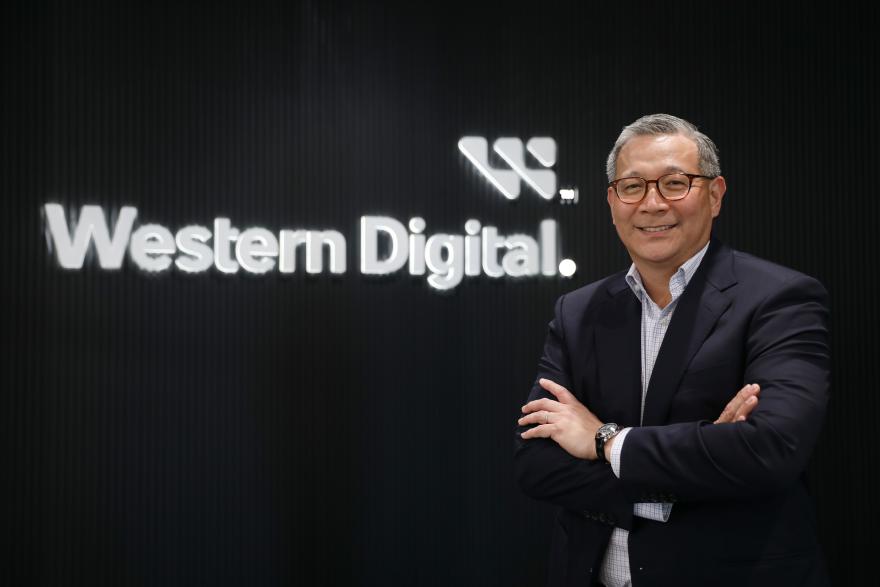[SINGAPORE] As chief executive of Western Digital, a major hard disk drive (HDD) maker, Irving Tan keeps a tight schedule.
Splitting his time between Singapore and San Jose, Tan is up from about 4.30 am and starts work within the hour. He steers the company through “extremely varied” issues, from discussions on tariffs and engineering roadmaps to setting out company values and engaging the media and investors.
“There’s really no typical day, and that’s one of the exciting things about the job. Through a 12-hour day, you toggle across many different things,” said Tan, who is also chairman of inflight caterer Sats.
An engineer by training and a Lego enthusiast, he relishes problem-solving and having “the mental ability to switch from one topic to the other”.
Tan is this year’s Outstanding Overseas Executive at the Singapore Business Awards. He has had a storied career in the global tech industry – including 13 years at US tech giant Cisco – and is still going strong.
The 55-year-old rose to the helm of Western Digital in February, after the company spun off its flash business to focus on HDDs. Having been through many tech cycles, he is now riding the artificial intelligence (AI) wave – which he cites as a strong tailwind for the data storage industry.
This is because AI is now being used to produce the very data that other AI models are trained on. For instance, an autonomous vehicle company can tap AI to create synthetic data on routes and landscapes, which can in turn train the AI model that powers the self-driving vehicle.
“And so for every model that’s created, this data that gets generated needs to be stored. That’s really fuelling the data generation and data storage industry,” he said.
The rise of disruptors, such as China’s DeepSeek, is a further boost. “If you can make the cost of deploying AI lower, you can make it more pervasive. Again, more data gets generated, more data gets stored.”
Formative experiences
A mechanical engineering graduate from Nanyang Technological University (NTU), Tan kicked off his career at energy company ExxonMobil as a graduate management trainee.
The job not only taught him about a range of functions – such as finance, sales and marketing, and operations – but also provided him valuable insights.
At one point, Tan grew frustrated with bureaucratic processes that did not add value, such as reports being created for their own sake and being left unread. He approached his manager.
“I was a young, idealistic, fresh graduate, and I used to complain to him: ‘All these things are broken’,” Tan recalled.
The manager’s response has stayed with him: “Someday you’ll be in a position to change that. Remember all the things that don’t work well, and when you’re in a position, make sure you go and fix it.”
Fixing problems indeed turned out to be Tan’s next career move. After earning a Masters of Business Administration degree from NTU, he joined consulting firm Kearney as a principal.
Tan worked in Australia and across South-east Asia, tackling business challenges in industries ranging from energy to telcos to fast-moving consumer goods.
“It’s either a transformation of a company or it’s a growth agenda or something to create more value for their shareholders. It’s always complex, large, enterprise-level problems, so I really enjoyed my time there,” he said.
Tan later moved on to the tech world, with roles at Cisco and HP. At Cisco, he climbed the ranks for more than a decade to become the company’s chief of operations, and eventually the chairman for Asia-Pacific, Japan and China.
Being interviewed for a leadership role within Cisco turned out to be another formative experience. Former Cisco chief executive John Chambers asked Tan what he had failed at recently.
“I thought long and hard about it and I said: ‘John, honestly I’m not trying to avoid the question – I can’t think of anything’,” Tan recalls.
“And his response actually left a very indelible mark on me, which I keep to today. He said: ‘Well, that means you’re not trying hard enough. We’re going to give you a big role. We need to really push the envelope. And therefore I need you to fail. If you don’t fail, it means you’re not pushing the envelope’.”
Taking the plunge
Tan is now focused on pushing the envelope at Western Digital. Beyond the core HDD business, he is also pursuing moonshot projects that leverage Western Digital’s deep technical expertise built over 55 years.
“We have a whole research team that specialises in material science, in electromagnetics, in servo-mechanical, firmware and semiconductor development. One of the things we’re looking at is… are there new areas that we can apply this knowledge to?”
One possibility the company is exploring is the application of its know-how in magnetic technology to the medical imaging industry, where there is interest in innovations such as reducing the size of scanners down to a probe.
“I want innovation to be at the heart of everything that we do so we can continue to modernise and transform,” said Tan.
He acknowledged the challenges ahead. Asked about the risk of US-China tensions, Tan noted that Western Digital operates in a “very dynamic” environment with a global supply chain. It has key customers in both China and the US and has to “deal with the geopolitical dynamic”.
“We continue to work closely to support our customers in those markets and (work) with the various administrations in those countries as well to ensure that they see the value of the business that we’re providing, enabling us to operate.”
Even as the world gets complex, Tan sees rich learning opportunities in leading a global company. He credits his wife and two children, aged 17 and 19, with allowing him to pursue the opportunities he has thus far.
Tan hopes that more young Singaporeans will take up corporate leadership roles outside the city-state.
“Singapore is a very comfortable place to live. It’s a very safe place and so it’s hard to leave. But there’s a big ocean out there,” he said.
“There’s a lot of experiences to be had, there’s a lot of learning that you can get out of it. I will encourage them to take the plunge.”



